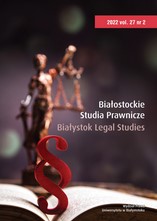Limiting the Right of Access to Public Information in the Age of COVID-19 – Case Study of Poland
Limiting the Right of Access to Public Information in the Age of COVID-19 – Case Study of Poland
Author(s): Mariusz Jabłoński, Dominika Kuźnicka-BłaszkowskaSubject(s): Constitutional Law, Human Rights and Humanitarian Law, Government/Political systems, Health and medicine and law
Published by: Temida 2
Keywords: democratic state of law; epidemic state; human rights; right to information;
Summary/Abstract: The right of access to public information is one of the most fundamental political rights granted to citizens under Art. 61 of the Polish Constitution. In the Act of 6 September 2001, not only was the procedure for providing the public information specified, but also some detailed rules on obliged entities. In practice, the right to access public information not only enables citizens to take mature political decisions, but also prevents the abuse, corruption, nepotism or waste of public funds. The transparency of public administration actions forces its representatives to behave by the book and to respect the rules governing a democratic state of law as well as human rights. Undoubtedly, the full implementation of the right of access to public information may not be possible in urgent and unexpected scenarios such as a state of emergency or martial law, but any restrictions should always be introduced in a proportionate manner and only to the extent necessary to protect other (more important) goods and values. The epidemic threat facing Poland in March 2020, followed by the state of the epidemic and the accompanying activities of the broadly understood legislator, have significantly impacted the implementation of the openness principle and the right to access public information in the country. Simultaneously, doubts were raised not only due to the scope and nature of these changes, but also because of their constitutionality. In order to obtain a full picture of these threats to the implementation of the law in question, one must take into account possible decisions of the Constitutional Tribunal (with positive or negative effects) in cases that will be ruled on soon. The analysis that we present is aimed not only at determining whether the functioning of the state in the epidemic regime justified the need to limit the constitutional right of access to public information, but also – in a broader systemic
Journal: Białostockie Studia Prawnicze
- Issue Year: 27/2022
- Issue No: 2
- Page Range: 207-221
- Page Count: 15
- Language: English

